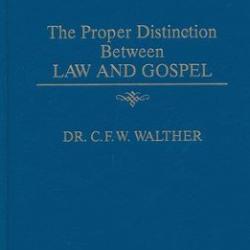Mark Jones briefly responded to my post in which I critiqued his book Antinomianism. His response can be found here. The response was largely disappointing, because Jones did not engage with the primary contention of the post, that the distinction between the two kinds of righteousness is a better manner in which to guard against antinomianism, because when utilizing that distinction, one will not utter utilize such confusing phrases as “good works are necessary for salvation.”
I’m not sure that Jones knows what the 2KR distinction is, or its use in Lutheran theology. Essentially, the two kinds of righteousness distinction teaches that everyone has two kinds of relationships: a relationship with God, and a relationship with other creatures. Each of these kinds of relationships functions differently. Before God (coram Deo) one is purely passive. One cannot work to earn salvation, but one receives it as a free gift. On the other hand, before the world (coram mundo), one is called to live a life of active service of the neighbor in obedience to God’s commandments. If we consistently affirm and distinguish between these two kinds of righteousness, we can avoid the ditches of both legalism (which puts active righteousness language in the coram Deo category) and antinomianism (which neglects the importance of God’s law coram mundo). My primary contention, regarding Jones’ book, is that while he rightfully emphasizes the goodness of God’s law, the necessity of all three uses of the law, and the reality of sanctification, he conflates these two kinds of righteousness in some of his phraseology.
Let’s look at one phrase in particular which gets at the heart of it: “Good works are necessary for salvation.”
Jones contends, throughout the book, that this phrase is good, right, and salutary. He also demonstrates that this phrase has been used by some Reformed theologians, such as Anthony Burgess. This is where a contrast between a Lutheran and Jones’ view of these matters is apparent.
There was one theologian in Lutheran history, named George Major, who utilized the phrase “good works are necessary for salvation.” The authors of the Formula of Concord, in Article IV, reject Major’s claim as damaging to the gospel. Major did, like Jones, argue that salvation was a broad term which encapsulates both justification and sanctification, and thus still held on to sola fide. However, the Reformers knew how confusing such language could be. In opposition to Major, the Formula contends: ““it is proper to reject the propositiones that good works are necessary for the salvation of believers or that it is impossible to be saved without good works” (FC SD IV.22). There are two primary reasons why this phrase is rejected by the Reformers. First, it is damaging to consciences seeking comfort in the gospel. Second, it is at odds with Paul’s teaching on justification.
Joel Biermann and Charles Arand explain the pastoral necessity of separating active righteousness from one’s coram Deo relationship:
“The need to distinguish the two kind of righteousness necessitates that our active righteousness dare never become the basis for our righteousness coram Deo. For any attempt to bring works into the presence of God will lead to a rejection of the Creator-creature relationship whereby we receive our identity and life as children of God as a sheer gift. And so the Reformation teaching argued that standing before God in heaven, human beings must leave all works behind on earth and seek nothing but the righteousness of Christ that is received by faith. When terrors of conscience result from the recognition of one’s inability to obtain salvation (Rome) or inability to find assurance of salvation (Pietism), it becomes dramatically obvious that active righteousness must remain on earth within the realm of our relationships with our fellow human creatures.” Arand and Biermann, “Why the Two Kinds of Righteousness,” 121. (The entire essay can be read here)
Whatever kind of explanation can be attached to the phrase, the contention that good works are necessary for salvation is pastorally damaging. If I were to proclaim, from the pulpit, that good works are necessary for salvation, no matter what kind of nuance I put on that claim, congregants would be thrown into despair. Salvation coram Deo is not the realm in which good works need to be placed. Rather, they are a result of one’s justification, performed in the world in which one lives.
The more important issue, of course, is the Biblical teaching regarding salvation. When examining the central texts, it is apparent that the most common New Testament utilization of the term “salvation” is in reference to justification and regeneration, rather than good works. Some texts explicitly separate works from salvation:
“For it is by grace you have been saved, through faith—and this is not from yourselves, it is the gift of God— not by works, so that no one can boast.” Ephesians 2:8-9
“But when the kindness and love of God our Savior appeared, he saved us, not because of righteous things we had done, but because of his mercy. He saved us through the washing of rebirth and renewal by the Holy Spirit, whom he poured out on us generously through Jesus Christ our Savior, so that, having been justified by his grace, we might become heirs having the hope of eternal life.” Titus 3:5-7
In several other texts, salvation is described in a manner identical with justification, and thus received by faith alone (Luke 1:77, 2 Tim. 3:15, Rom. 1:16, Eph. 1:13). The only text which could possibly be utilizes to argue that salvation, broadly speaking, includes good works is Philippians 2:12. However, the text need not be read in such a way. Paul is simply arguing that good works and sanctified living are the outworking of salvation. There is simply no Biblical basis to utilize the term “salvation” as something which encompasses good works as a condition. Thus, Biblically speaking, saying “good works are necessary for salvation,” is not really any different than arguing “good works are necessary for justification.”
The problem with Jones’ book is that several phrases like this are used, which conflate the two kinds of righteousness. This language is at best, extremely confusing and unhelpful, and at worst, damaging to the souls of despairing Christians.












